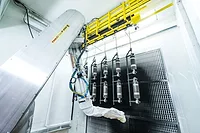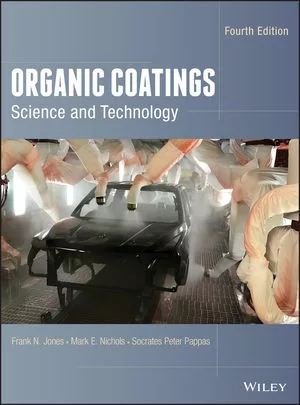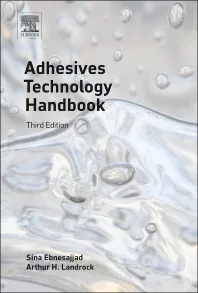Liquid Glass Coating Technology
This company's award-winning “liquid” glass coatings allow the end user to apply a nano-scale layer of super-durable, super-phobic, highly flexible glass to almost any surface.

I recently became aware of this new technology, and the project manager at Nanopool graciously extended to me the liberty of taking previously published material and presenting it in PCI. The following information is taken from the Nanopool website, press releases and an editorial written for journals in the healthcare industry.
Nanopool GmbH is recognized as a world leader in SiO2-Liquid Glass Nano Layering technology. Its award-winning “liquid” glass coatings allow the end user to apply a nano-scale layer of super-durable, super-phobic, highly flexible glass to almost any surface. This technology is revolutionizing how we manage our environment. The liquid glass attributes have resulted in the coating being regarded as one of the most important surface coating technologies to have emerged in recent years.
Apart from a select group of professionals, few people know about this stunning technology. If one walks around the Ataturk’s Mausoleum in Ankara you are walking on it. If you visit certain hospitals in the United Kingdom you are touching it. If you see an unusually clean train you are probably looking at it, and if you wonder how your white settee looks so clean, you may be sitting on it. All of these surfaces have been coated with invisible glass.

The water-based solution is designed for absorbent surfaces such as stone, wood and fabrics, whereas the alcohol-based solution is designed for metal, glass, plastic and painted surfaces. Almost all surfaces can be coated with SiO2 NLT, with the exception of Teflon or other non-stick coatings. Additionally, all surfaces must be completely clean prior to application, as a finger print can be 100 times thicker than the coating. There are no polymeric binding agents used in the solution – only SiO2 and water or ethanol.
It is believed that Van der Waals forces enable the SiO2 layer to polymerize rapidly and adhere to the surface. Keep in mind that nano-scale technologies perform very differently than their micro- or macro-scale counterparts – hence the unusual characteristics and benefits.
The glass coating, being approximately 100 nanometers thick, is completely undetectable, is food safe and environmentally friendly and also a winner of the U.K. Green Apple Award.

For more information, visit www.nanopool.eu or www.nanopool.co.uk or e-mail neil.mcclelland@nanopool.co.uk.

I recently became aware of this new technology, and the project manager at Nanopool graciously extended to me the liberty of taking previously published material and presenting it in PCI. The following information is taken from the Nanopool website, press releases and an editorial written for journals in the healthcare industry.
Nanopool GmbH is recognized as a world leader in SiO2-Liquid Glass Nano Layering technology. Its award-winning “liquid” glass coatings allow the end user to apply a nano-scale layer of super-durable, super-phobic, highly flexible glass to almost any surface. This technology is revolutionizing how we manage our environment. The liquid glass attributes have resulted in the coating being regarded as one of the most important surface coating technologies to have emerged in recent years.
Apart from a select group of professionals, few people know about this stunning technology. If one walks around the Ataturk’s Mausoleum in Ankara you are walking on it. If you visit certain hospitals in the United Kingdom you are touching it. If you see an unusually clean train you are probably looking at it, and if you wonder how your white settee looks so clean, you may be sitting on it. All of these surfaces have been coated with invisible glass.

SiO2 NLT
The SiO2 nano layering technology (NLT) evolved from manipulation of the sol-gel process. This process is a wet chemical technique (chemical solution deposition). While the process has been known for years, Nanopool refined it to create “liquid glass” or “glass in a bottle”. Molecules of SiO2 (pure quartz glass) are isolated and held in a solvent of either water or ethanol. This “solution” can then be wiped or sprayed onto most any surface. The subsequent coating forms a layer of pure glass, which is approximately 100 nanometers thick.The water-based solution is designed for absorbent surfaces such as stone, wood and fabrics, whereas the alcohol-based solution is designed for metal, glass, plastic and painted surfaces. Almost all surfaces can be coated with SiO2 NLT, with the exception of Teflon or other non-stick coatings. Additionally, all surfaces must be completely clean prior to application, as a finger print can be 100 times thicker than the coating. There are no polymeric binding agents used in the solution – only SiO2 and water or ethanol.
It is believed that Van der Waals forces enable the SiO2 layer to polymerize rapidly and adhere to the surface. Keep in mind that nano-scale technologies perform very differently than their micro- or macro-scale counterparts – hence the unusual characteristics and benefits.
The glass coating, being approximately 100 nanometers thick, is completely undetectable, is food safe and environmentally friendly and also a winner of the U.K. Green Apple Award.

Application Markets
Key Point Summary of SiO2 NLT
- SiO2 (silicon dioxide) is the chemical term for quartz glass.
- Liquid glass is invisible to the naked eye, as it is only 100 nm thick – (approximately 500 times thinner than a human hair). The coating does not alter the appearance or texture of the treated surface.
- SiO2 “liquid glass” can be applied to all surfaces, (including glass, metals, fabrics, stone, plastic, food packaging, operating theatres, skin, computers, food processing areas, cars, shipping, aircraft); in fact the list is almost endless.
- Liquid glass is applied by spraying, dipping or wiping.
- It is food safe and mucosa friendly, and has no negative physiological impact.
- It is super-phobic (rejects all soiling elements, including solvents, acids and alkalis (0.5 pH to 12.5 pH)
- It is highly durable; domestic quality variants last approximately one year per application. Professional variants last 10 years. Certain treatments last even longer. (The coating will not decay and is only removed by chemical or mechanical action.)
- It is heat tolerant (-150 to +450 °C) and so can be applied to ovens, freezers, wash basins etc. It removes the need for oven-cleaning chemicals; simply clean ovens with water and a cloth. It is UV-stable, chemically inert and cell neutral and so it can be used for in-vivo application.
- It is “particle free” i.e., does not contain any potentially dangerous nano particles.
- It is
flexible (200%) and breathable at the molecular level and so it can be applied
to wood, fabrics, stone work and statues, as these areas need to breathe and
expand /contract.
- It can be applied with great ease, no special equipment is needed.
- All surfaces become easy to clean, and in most instances cleaning can be carried out with water alone. This is the case within butchery departments, where NP-coated areas are cleaner after being washed with water than those areas which have been cleaned with a chlorinated agent. Savings of 30% on cleaning are the norm. (Audited figures.)
- Treated surfaces become "bio-static " through ionic exchange (this creates an environment that will not support bacterial growth) and so the treatments are ideal for sinks, taps, food-prep areas, nurseries, door handles, toilets, cash registers, conveyor belts, gyms, schools, hospitals, chiller cabinets etc. Nanopool supplies an anti-bacterial variant, which satisfies ASTMS E 2180.The anti-bacterial variant kills bacteria for the life of the coating. Most anti-bacteria treatments are short lived or exceptionally expensive. The company offers savings of over 3000% on items such as anti-bacterial light switches and shower trays.
- This technology is new to the UK, but the company already works with some of the world’s largest organizations. They also treat trains (London-Midland), both inside and out, Kempinski hotels, Spar food processing factories, McDonald’s (Austria and Germany), bakeries, health care environments etc. These products are now being applied in some of Europe’s leading supermarkets. The company has recently coated Ataturk’s Mausoleum in Ankara (750,000m2).
- A range of specialist products is provided, such as anti-corrosion, anti-graffiti, anti-fingerprint, skin protection, cork protection and variants for plants.
For more information, visit www.nanopool.eu or www.nanopool.co.uk or e-mail neil.mcclelland@nanopool.co.uk.
Looking for a reprint of this article?
From high-res PDFs to custom plaques, order your copy today!







